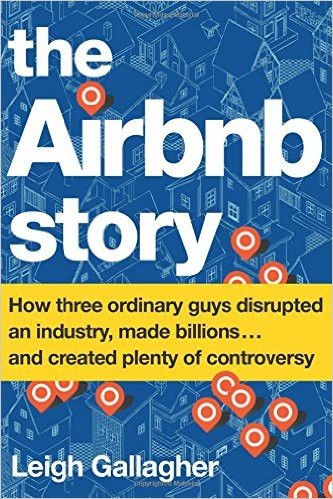“One of my biggest strengths was precisely how little I knew.” — Brian Chesky
The Airbnb Story is the remarkable behind-the-scenes story of the creation and growth of Airbnb, the online travel platform that has become — in less than a decade — the largest provider of accommodations in the world.
It’s the first book solely dedicated to the extraordinary phenomenon of Airbnb.
This is also the first in-depth study of Airbnb’s leader, Brian Chesky, the quirky and ‘pathologically’ curious young CEO, and his co-founders as they steer the ship into markets well beyond lodging and into uncharted new territory.
Below are 7 lessons on entrepreneurship I learned from the book.
But before we jump onto the lessons, let’s have a look at some numbers.
Airbnb by the numbers
→ Airbnb’s revenue in 2016 was $1.6 billion, and the company also turned cashflow positive that year.
→ Airbnb has had almost 160 million “guest arrivals,” more than 70 million of which occurred in 2016. (Guest arrival means when a guest has checked in with their host).
→ As of November 2016, Airbnb was adding 1.4 million guests a week.
→ Airbnb has roughly 3 million listings in 34,000 cities across 192 countries. 80% of them are outside North America.
→ The average age of an Airbnb host is 43 years.
→ They’ve spent less than $300 million in eight years since its founding. (Uber, by comparison, is said to have lost $1.2 billion in the first six months of 2016 [1])
There’s no doubt that Airbnb is marching forward relentlessly to become the World’s First Community Super Brand.
Their recent #weaccept Superbowl ad campaign justifies the company’s commitment towards its mission of — BELONG ANYWHERE. [2]
Okay, now let’s get back to the lessons.
— –
Hustle. Be Scrappy.
Brian Chesky and Joe Gebbia first launched Air Bed and Breakfast in October 2007 because their rent for the next month was due soon.
They got Amol Suarve as their first guest who had come to San Francisco all the way from Mumbai to attend a design conference.
The co-founders dodged registration fee by posing as bloggers. Chesky had a camera slung up around his neck so as to best resemble a blogger, and excitedly talked up their new service.
He pitched anyone and everyone. In fact, he’d poke Amol saying “Ask him how great it is!” — to give a live product demo to the attendees at the conference.
One of the most creative hustles the co-founders showed was during the DNC in Denver during the 2008 election.

The co-founders scoured San Francisco’s supermarkets to find which sold the cheapest cereal and filled up shopping cart after shopping cart until they had a thousand boxes of one-dollar cereal.
They sold out the Obama O’s in three days of the DNC campaign and raised somewhere between $20,000 to $30,000.
“You guys are like cockroaches. You just won’t die.” — Paul Graham
When in hustle mode, don’t shoot for perfection. Rather focus on execution. Draw conclusions, learn your lessons, and move to your next target.
It’s easy to get stuck inanalysis paralysis when you’re trying to launch your big idea or ship that project close to your heart.
When in hustle mode, focus on maintaining your inertia of motion instead. There’s always going to be time for you to make it better.
— –
Persistence, Persistence, Persistence.
Below are 5 rejection emails [3], the co-founders got while they were trying to raise $150,000 at a $1.5M valuation back in the summer of 2008.
For $150,000, one could have bought 10% of Airbnb which would have been $3B today.





Next time you face a rejection, learn what you could have done better.
And then keep moving forward.
“The biggest enemy of a start-up is your own confidence and your own resolve.” — Brian Chesky
In fact, in a landmark 80-year long study on human longevity [4], researchers found that the secret to living a longer life had nothing to do with happiness, a lack of stress, avoiding hard work, or a lack of worry.
The secret to living a longer life was –
Living conscientiously and using forethought, planning, and perseverance in all aspects of one’s life.
Hard work and persistence may not get much media coverage compared to the 4-hour work week lifestyle that has garnered peak attention over the last decade.
But in the end, even research supports the fact that it pays off to be a persistent motherfucker.
If you want to stay longer on this earth, keep persisting.
— –
Make Something People Want.

Despite the pushback Airbnb is getting from regulators in the city of New York, San Francisco, Toronto, Vancouver, Reykjavik — the numbers speak for itself — People Love Airbnb.
Gweneth Paltrow. Rihanna. Emma Stone. Beyonce. Mariah Carey. They all use and love Airbnb [5].
The most honest and vulnerable writer on the internet, James Altucher has been living in Airbnb since 2015 [6].
The company’s mission — Belong Anywhere — isn’t just a single moment; it is a transformation people experience when they travel on Airbnb.
“If we share our homes with one another, we can get to know each other and bring each other together in a peaceful unity that doesn’t have borders! This company is about bringing people together and about loving one another” — Ashton Kutcher
If you’re an entrepreneur working on your start-up or have a ‘world changing’ idea, ask yourself — “Will 100 people love to use this product?”
Once you get those 100 people, you may be on to something big [7].
— –
Just Keep Launching.
Airbnb launched three times before the rocket ship took off i.e. when they raised a total of $615,000 in funding from Sequoia and Youniversity at a $2.4 million valuation.
The co-founders used each launch as an opportunity to get more and more press.
“The reasonable man adapts himself to the environment. The unreasonable man adapts the environment to him. Therefore, all progress depends on the unreasonable man.” — Brian Chesky
So, don’t get too caught up in ‘imagineering’ things. Just keep launching.
— –
Stop Making Decisions by Consensus.
On June 29, 2011, a woman named EJ published a wrenching post on her blog about how Airbnb renters had trashed her home earlier that month. It wasn’t just trashed, it was violently destroyed.
It was an extreme version of what could go wrong, well beyond anyone’s imagination.
On July 27, Chesky released the company’s first public response and attempted to reassure the community that someone was in custody, that Airbnb held safety as its highest priority, and that it had been in close contact with EJ and authorities to “make this right”.
But the letter made things worse.
EJ felt unheard and wrote another post contradicting Chesky’s claim. Meanwhile, another Airbnb user came forward with an equally horrific story about how crystal-meth users had similarly trashed his apartment a few months earlier.
The bad situation was getting worse.
On Monday, August 1, Chesky posted a strongly worded letter.

Chesky was receiving advice from people, left and right.
His biggest takeaway from this experience: stop making decisions by consensus.
“A consensus decision in a moment of crisis is very often going to be the middle of the road and they’re usually the worst decision. Usually in a crisis you have to go left or right.” — Brian Chesky
Often, people give advice based on their own personal experiences and references.
The rule that I like to follow — don’t follow people’s advise if you won’t switch places with them.
Stop making decisions by consensus.
— –
Be Pathologically Curious.
During the Y Combinator residency program, Paul Graham suggested the co-founders to go to the early adopters of Airbnb.
This involved Nate handling the company’s technical infrastructure out of San Francisco while Chesky and Gebbia flew to New York City back and forth every week to learn everything they could about their users.
The three of them constantly pestered Paul every single week, even though he doesn’t have time to do office hours.
He also noted that having seen several hundred start-ups come through the program, he’d observed an interesting pattern: the most successful companies always end up being the ones that participated most eagerly.
“We just showed up before everyone else and stayed after everyone else. We were more shameless than other people, and we were more curious.” — Brian Chesky
Instead of looking at the world through the lenses of certainty, look at it through the lenses of possibility.
Curiosity helps to unthink and let go of all societal beliefs and assumptions and experience the world as a child who sees infinite possibilities.
“We made the classic mistakes that all investors make. We focused too much on what they were doing at the time and not enough on what they could do, would do, and did do.” — Fred Wilson of Union Square Ventures on dismissing investment opportunity in Airbnb.
— –
Be a Missionary.
The Samwer brothers are a trio out of Berlin who owns the venture capital firm, Rocket Internet.
Their strategy is plain and simple — Find Silicon Valley successes, copy them, then launch “clones” in markets like Western Europe and Africa before the originals arrive.
So they did the same with Airbnb by launching the knockoff site ‘Wimdu’ in the European market. Wimdu used aggressive tactics like poaching listings from Airbnb’s nascent business in Europe and soliciting hosts to switch to Wimdu.
Airbnb was at a serious disadvantage. Soon enough, the Samwer brothers made a proposition to Airbnb to sell it Wimdu.
Chesky got advice from the top minds in Silicon Valley.
Andrew Mason, CEO of Groupon said — “Wimdu had the potential to kill Airbnb.” [8]
Mark Zuckerberg advised Chesky not to buy, saying — “Whoever has the best product will win.”
In the end, Chesky took Paul Graham’s advice who told him that —
“The difference between Airbnb and Wimdu is that Airbnb owners are missionaries, and Wimdu owners are mercenaries. Missionaires usually win.”
Rocket Internet’s stock price has fallen 62% since 2014, 12 of its start-ups have officially closed, and almost all of them are currently losing money. Back in December 2015, the company was forced to issue a profit warning, telling investors it lost $691M in the first half of the year.
On the other hand for Airbnb, revenue is expected to grow to $2.8 billion in 2017 and $8.5 billion by 2020.
When you’re building something, make sure you’re not driven by the notion of killing someone to be the last man standing.
There’s plenty of space, time, money, resources for your product/company/idea to coexist in the world while making this world a better place.
Adopt a missionary mindset instead.
Start with why.
Lead with a purpose.

P.S. If you’re reading this line, you may as well click the ‘heart’ button on the left 🙂
References
- Bloomberg article on Uber’s estimated loss of $1.2 billion in 2016
- I recently had the opportunity to listen to Nathan Blecharczyk speak at the NewCo BayArea Festival 2017. He shared how they got the 30 sec Superbowl slot on Thursday, and then shipped the video over the next 48 hours.
- Brain Chesky wrote a medium post on the 7 rejections he got.
- The Longevity Project:Surprising Discoveries for Health and Long Life
- Celebrities who love Airbnb
- James Altucher’s post on how he ditched everything he owned and started living in Airbnb fulltime
- Kevin Kelly also has an inspiring post called 1000 true fans that I highly recommend.
- Andrew Mason had gone through a similar experience with Rocket Internet who sold them Groupon’s copycat CityDeals back in 2010 for $170M.
- I heard this on the Unmistakable Creative podcast episode on — The Neuroscience of Goal Setting by Dr. Srini Pillay
Originally published at medium.com


